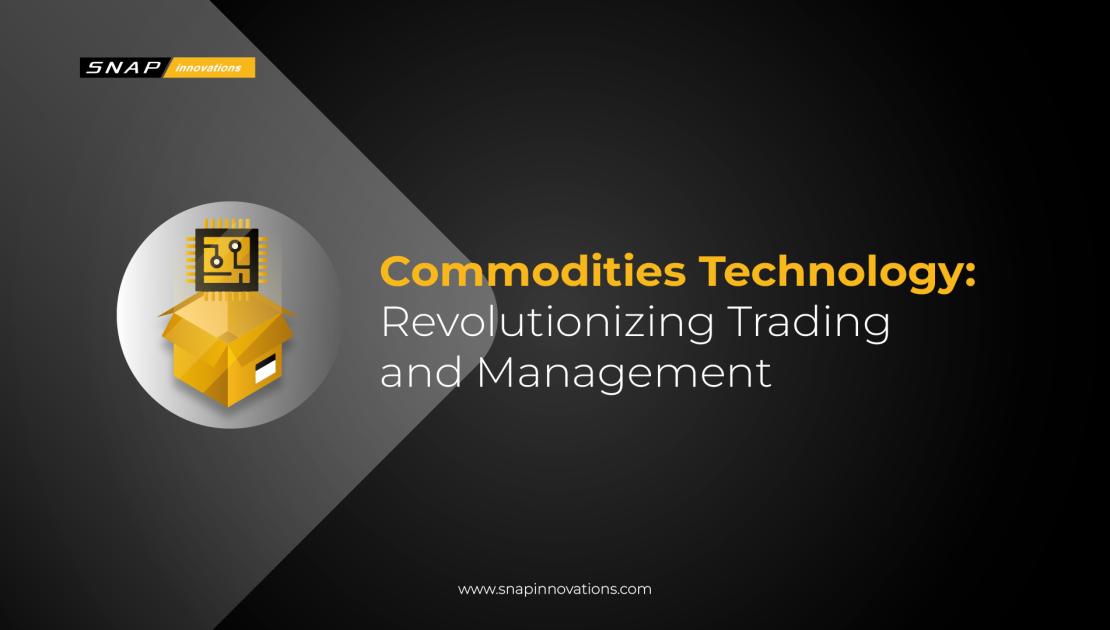Commodities Technology: Innovations in Trading and Management

Commodities have been the lifeblood of human civilization for centuries. From the food we eat to the energy that powers our homes, commodities are the raw materials that fuel our daily lives. The commodities market, a vast and intricate network of production, trading, and consumption, has always been at the heart of the global economy.
But this world is not immune to change. In recent years, it’s undergone a significant transformation, driven by the relentless march of technology. In this article, we’ll delve into the realm of commodities technology, uncovering the exciting developments that are reshaping this essential sector.
What is Commodities Technology?
Commodities technology, often affectionately known as “comtech,” is the digital revolution sweeping through the commodities market. It encompasses a dazzling array of technologies, from advanced data analytics to blockchain, all aimed at making commodities trading and management more efficient, transparent, and sustainable. Think of it as the digital toolkit that’s turbocharging an industry that once operated largely on manual processes and paperwork.
But what exactly does it do? Well, imagine you’re a coffee trader. In the past, tracking the journey of your coffee beans from a remote farm in Colombia to a café in New York would have been a herculean task. With commodities technology, it’s as simple as a few clicks. You can trace every step of the journey, from the moment the beans are picked to when they’re brewed into your morning cup of joe. It’s not just coffee; this level of transparency extends to everything from crude oil to precious metals, ensuring that what you buy and consume is sourced responsibly.
And that’s just the tip of the iceberg. Commodities technology also helps farmers optimize crop yields, reduces waste in the supply chain, and even enables ethical trading practices. It’s a game-changer that’s reshaping an industry that’s fundamental to our daily lives.
Also Read: Trading Infrastructure: The Backbone of Financial Markets
The Digital Revolution in Commodities Trading
1. Digital Marketplaces
Digital marketplaces have not only transformed commodities trading but have also democratized access to the commodities market. These platforms offer traders an extensive array of commodities, from precious metals to agricultural products, making it easier for both institutional and individual investors to diversify their portfolios.
The wealth of information available on these platforms, including historical pricing data, market news, and expert analysis, empowers traders to make data-driven decisions, ultimately improving their trading strategies and risk management.
2. Algorithmic Trading
Algorithmic trading has evolved into a formidable force in commodities markets. These algorithms, fueled by big data and machine learning, can process enormous datasets, identify intricate patterns, and execute orders with unrivaled precision.
Beyond speed, algorithms adapt to changing market conditions, enabling traders to navigate volatile markets with confidence. Algorithmic trading’s ability to automate complex strategies has become a cornerstone of commodities trading, providing traders with a competitive edge.
3. Blockchain for Trust
Blockchain technology’s impact on commodities trading extends beyond trust; it streamlines processes and enhances security. Smart contracts, built on blockchain, automate trade settlements, reducing the risk of errors and disputes.
Immutable ledgers ensure transparency throughout the supply chain, benefiting not only traders but also consumers concerned about product authenticity and ethical sourcing. The trust engendered by blockchain has also attracted new participants to the commodities market, including those from industries where transparency and traceability are paramount.
4. Real-time Analytics
Real-time analytics tools have become indispensable for commodities traders seeking a competitive edge. These tools not only provide access to historical data but also employ advanced algorithms to identify trends and potential market-moving events.
Additionally, machine learning algorithms continuously refine predictive models, enabling traders to stay ahead of the curve. The ability to assess real-time data and act swiftly based on insights has redefined how traders approach commodities markets.
5. Mobile Trading Apps
Mobile trading apps have revolutionized commodities trading by placing it at the fingertips of traders on the move. These user-friendly apps offer a seamless trading experience, complete with real-time market updates and advanced order execution capabilities.
Whether you’re a seasoned trader managing a portfolio or a novice exploring opportunities, the convenience of mobile trading apps ensures that you’re always connected to the commodities market, ready to capitalize on emerging trends and market shifts.
6. Global Accessibility
The digital revolution has rendered geographical borders obsolete in commodities trading. Traders from diverse regions and time zones can participate in global commodities markets around the clock.
This global accessibility not only enhances market liquidity but also broadens the range of available commodities for trading. It fosters a dynamic and competitive trading environment, where opportunities abound, and market dynamics are shaped by a diverse set of participants.
7. Enhanced Risk Management
Advanced risk management tools have emerged as essential companions for commodities traders. These tools provide traders with a multifaceted approach to risk mitigation, from setting precise stop-loss orders to employing sophisticated hedging strategies.
Additionally, data-driven risk assessment tools offer traders a deeper understanding of potential risks, allowing them to proactively manage and minimize their exposure to market volatility. Effective risk management is the linchpin of successful commodities trading in an increasingly complex and dynamic market.
8. Sustainability Integration
Sustainability considerations have become integral to commodities trading. Digital platforms now offer comprehensive sustainability metrics, enabling traders to align their investments with ethical and environmentally responsible principles.
By assessing not only financial but also environmental and social impacts, traders can make informed choices that support sustainable resource management and ethical trading practices. This integration underscores the commodities industry’s commitment to responsible and ethical trading, reflecting broader societal values.
The digital revolution in commodities trading continues to reshape the industry, offering traders unprecedented access, efficiency, and transparency. These technological advancements empower traders to make well-informed decisions, navigate complex market conditions, and contribute to responsible and ethical practices in the commodities market.
Sustainability in Commodities Technology
 Sustainability is a paramount consideration in the rapidly evolving landscape of commodities technology. The exponential growth of blockchain networks and cryptocurrencies has raised concerns about energy consumption and environmental impact. In response, industry players are actively exploring and implementing innovative solutions to mitigate these challenges. One significant approach is the adoption of energy-efficient consensus mechanisms, such as proof-of-stake (PoS) and delegated proof-of-stake (DPoS), which drastically reduce the energy consumption associated with traditional proof-of-work (PoW) blockchains.
Sustainability is a paramount consideration in the rapidly evolving landscape of commodities technology. The exponential growth of blockchain networks and cryptocurrencies has raised concerns about energy consumption and environmental impact. In response, industry players are actively exploring and implementing innovative solutions to mitigate these challenges. One significant approach is the adoption of energy-efficient consensus mechanisms, such as proof-of-stake (PoS) and delegated proof-of-stake (DPoS), which drastically reduce the energy consumption associated with traditional proof-of-work (PoW) blockchains.
Moreover, the transition to renewable energy sources for powering data centers and blockchain infrastructure is gaining traction. The integration of solar, wind, and hydroelectric power into the energy mix of data centers is becoming increasingly common, reducing the overall carbon footprint. Responsible mining practices, which prioritize energy efficiency and the use of green energy, are aligning with sustainability goals. Some blockchain projects are even exploring carbon offset initiatives to further neutralize their environmental impact.
Transparency regarding the carbon footprint of blockchain networks is now considered essential. Environmental, Social, and Governance (ESG) reporting frameworks are being developed to assess and communicate the sustainability efforts of commodities technology providers. Investors and consumers are showing a growing preference for environmentally responsible businesses, and companies that embrace sustainability are well-positioned to attract capital and gain a competitive edge.
Challenges of Commodities Technology
 Innovation rarely comes without its fair share of challenges. Here, we’ll explore some of the hurdles and what the future might hold for commodities technology.
Innovation rarely comes without its fair share of challenges. Here, we’ll explore some of the hurdles and what the future might hold for commodities technology.
1. Cybersecurity Risks
Cybersecurity is a constantly evolving challenge in commodities technology. Threat actors are becoming increasingly sophisticated, employing tactics like zero-day exploits and social engineering. Trading platforms must continuously invest in state-of-the-art cybersecurity measures, including advanced intrusion detection systems, threat intelligence feeds, and the development of security incident response teams (SIRTs).
Regular red team exercises, vulnerability assessments, and security audits are essential to proactively identify and address vulnerabilities. Additionally, comprehensive employee training and awareness programs are vital to mitigate the risk of insider threats and ensure a vigilant workforce.
2. Data Privacy Concerns
As data privacy regulations become more stringent worldwide, navigating compliance is a complex endeavor. Companies must adopt a comprehensive approach, including implementing robust encryption protocols, multi-factor authentication, and strict access controls.
Data anonymization and pseudonymization techniques help protect individual privacy while enabling data-driven insights. Maintaining a comprehensive record of data processing activities, conducting regular data protection impact assessments (DPIAs), and appointing Data Protection Officers (DPOs) are essential steps to ensure compliance with data privacy regulations like GDPR and CCPA.
3. Regulatory Compliance
The commodities industry faces a web of evolving regulations, including financial, data privacy, and anti-money laundering (AML) rules. Achieving and maintaining compliance requires dedicated efforts in regulatory monitoring and reporting.
Fostering collaboration between industry players, regulatory authorities, and industry associations helps ensure that compliance practices are aligned with the latest regulatory requirements. Regulatory technology (RegTech) solutions that automate compliance tasks, such as transaction monitoring and reporting, can significantly aid in navigating this complex landscape.
4. Market Manipulation
Detecting and preventing market manipulation is a complex challenge, given the increasing use of algorithmic trading and high-frequency trading (HFT) strategies. Regulators and market participants must continually enhance market surveillance systems. Advanced analytics, machine learning algorithms, and natural language processing are employed to monitor and detect suspicious trading activities in real-time.
The collaboration between regulatory bodies, exchanges, and market participants is crucial to swiftly address emerging manipulation techniques and maintain market integrity.
5. Technological Dependencies
Mitigating the risks associated with technological dependencies requires a proactive stance. Regular system audits and third-party security assessments help identify vulnerabilities and security gaps. Stress testing and scenario planning are essential components of disaster recovery and business continuity planning.
Developing a robust incident response plan, which includes communication strategies and coordination with relevant authorities, ensures a swift response to any technical disruptions.
6. Environmental Impact
Addressing the environmental impact of commodities technology involves considering energy efficiency and sustainability. Exploring energy-efficient consensus mechanisms, such as proof-of-stake (PoS) for blockchain networks, can significantly reduce the energy consumption associated with mining cryptocurrencies.
Embracing renewable energy sources for data centers and blockchain networks, coupled with responsible mining practices, contributes to a more sustainable commodities ecosystem. Transparent reporting on the carbon footprint of blockchain networks is also becoming essential for environmentally conscious investors.
7. Data Accuracy
Ensuring data accuracy at its source is critical for maintaining trade integrity. Industry-wide initiatives are required to standardize data formats and enhance data validation mechanisms.
Smart contracts on blockchain platforms can play a pivotal role in automating data validation and reconciliation processes, minimizing the potential for inaccuracies. Additionally, cross-industry collaborations that establish data quality standards and provide mechanisms for data feedback and corrections can further enhance data accuracy.
8. Market Fragmentation
Reducing market fragmentation is a complex challenge, given the proliferation of digital marketplaces and trading platforms. To streamline trading practices, industry stakeholders can work on the development of unified APIs and data standards.
Regulatory harmonization efforts should aim to align compliance requirements, reducing complexity for market participants. Initiatives like the International Organization for Standardization (ISO) standards for commodities trading can contribute to achieving interoperability among trading platforms.
Addressing these multifaceted challenges in commodities technology necessitates a coordinated effort among industry participants, regulatory bodies, and technology providers. Proactive and innovative solutions, combined with ongoing vigilance, are essential to ensure the resilience, compliance, and sustainability of commodities technology in a rapidly evolving landscape.
The Future of Commodities Technology
 The future of commodities technology is poised for groundbreaking transformation, driven by an array of technological innovations and evolving market dynamics. Blockchain technology, which underpins many commodities trading platforms, is set to revolutionize supply chains, enhancing transparency and traceability. Decentralized finance (DeFi) applications are gaining momentum, offering new opportunities for commodities trading, lending, and investing, while also posing regulatory challenges.
The future of commodities technology is poised for groundbreaking transformation, driven by an array of technological innovations and evolving market dynamics. Blockchain technology, which underpins many commodities trading platforms, is set to revolutionize supply chains, enhancing transparency and traceability. Decentralized finance (DeFi) applications are gaining momentum, offering new opportunities for commodities trading, lending, and investing, while also posing regulatory challenges.
Artificial intelligence (AI) and machine learning are playing an increasingly pivotal role in market analysis, predictive modeling, and risk management, enabling more informed and data-driven decisions. Furthermore, the emergence of tokenization promises to unlock liquidity in traditionally illiquid assets, allowing fractional ownership and trading of commodities. The integration of Internet of Things (IoT) devices and sensors in supply chains enhances real-time tracking and quality assurance. However, as technology advances, so do cybersecurity risks and regulatory complexities, demanding robust solutions and regulatory frameworks. In sum, the future of commodities technology is a dynamic landscape, where innovation and resilience will be central to shaping its evolution.
Also Read: 10 Top Trading Platforms in Singapore in 2023
Conclusion
In a world where commodities are the building blocks of our daily lives, commodities technology has emerged as a transformative force, reshaping the way we trade, manage, and consume vital resources. This digital revolution, affectionately known as “comtech,” has ushered in an era of unparalleled efficiency, transparency, and sustainability in the commodities industry.
From blockchain-powered supply chain traceability to the integration of renewable energy sources, commodities technology has made responsible and ethical practices not just a goal but a reality. It has empowered traders, investors, and consumers to make informed decisions about the commodities they buy and use, ensuring responsible sourcing and ethical trading practices.
I'm Kris, a fintech writer with three years of experience. I've been on a mission to simplify the intricacies of trading through my words, bridging the gap between technology and finance. Join me on this journey as I empower traders and investors with clear, engaging content in the dynamic world of fintech.

